Constant Current: The Key to Efficient Hydrogen Production
 Suyzeko
Suyzeko
 Jul 18,2025
Jul 18,2025

Constant Current: The Key to Efficient Hydrogen Production
Why Constant Current Design is Essential for SPE Hydrogen Production
In the world of power control, two main methods dominate: **constant current design** and **constant voltage design**. Each has its unique applications and benefits. However, when it comes to **SPE (Solid Polymer Electrolyte) hydrogen production technology**, constant current design takes the lead. Let’s explore why this is the case and how it impacts the efficiency and stability of hydrogen production.
Understanding Constant Current vs. Constant Voltage
Constant Voltage Design
Constant voltage design maintains a stable output voltage, making it ideal for devices sensitive to voltage fluctuations, such as LED lights and electronic equipment. A steady voltage ensures these devices operate smoothly without the risk of damage from voltage spikes or drops.
Constant Current Design
Constant current design focuses on maintaining a stable output current, which is crucial in applications like battery charging and **SPE hydrogen production technology**. Here, the stability of the current directly impacts the efficiency and longevity of the system.

Why Constant Current Design is Essential for SPE Hydrogen Production
In **SPE hydrogen generators**, the efficiency of hydrogen production is directly tied to the current. Here’s why constant current design is a game-changer:
1. **Stable Hydrogen Production**: The efficiency of SPE hydrogen production depends on the current. Constant current design ensures the current remains stable, leading to consistent and efficient hydrogen production. This stability is crucial for maintaining desired output levels over time.
2. **Protection Against Voltage Fluctuations**: Voltage fluctuations can disrupt the electrolysis process. Constant current circuits mitigate these fluctuations, ensuring the electrolyzer and membrane electrodes are not subjected to unnecessary stress. This improves efficiency and extends equipment lifespan.
- **Reduced Maintenance Costs**: By maintaining a stable current, constant current circuits reduce wear and tear on the electrolyzer and membrane electrodes. This results in fewer breakdowns and lower maintenance costs, a significant advantage in industries where downtime is costly.
The Cost Factor: Is It Worth It?
Constant current circuits are typically more expensive due to the need for more complex control circuits and components. However, for **SPE hydrogen production**, the benefits far outweigh the initial costs.
The stability and efficiency provided by constant current design lead to higher hydrogen production rates and longer equipment lifespans. Over time, these benefits translate into cost savings that offset the initial investment. In applications where current stability is critical, such as SPE hydrogen generators, the long-term advantages make constant current design the preferred choice.
Real-World Applications: SPE Hydrogen Generators
In **SPE hydrogen generators**, the importance of constant current design cannot be overstated. These generators rely on efficient and stable hydrogen production, and any current fluctuations can lead to suboptimal performance. Constant current circuits ensure these generators operate at peak efficiency, producing maximum hydrogen with minimal downtime.
Moreover, constant current design aligns with the growing demand for sustainable and efficient energy solutions. As the world moves towards cleaner energy sources, technologies like SPE hydrogen production will play a crucial role. Ensuring these technologies operate efficiently and reliably is essential for their widespread adoption.Stable circuit control, so that the temperature of the equipment is still safe even after 8 hours of continuous operation.
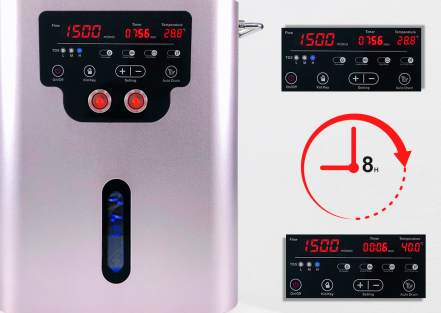
## Conclusion: The Future of Hydrogen Production
While both constant current and constant voltage designs have their places in power control, **constant current design** stands out as the superior choice for **SPE hydrogen production**. Its ability to maintain stable current levels ensures efficient hydrogen production, protects equipment from voltage fluctuations, and reduces long-term maintenance costs.
As we continue to develop sustainable energy solutions, the importance of technologies like SPE hydrogen production will only grow. By leveraging the benefits of constant current design, we can ensure these technologies operate at their full potential, paving the way for a cleaner, more sustainable future.
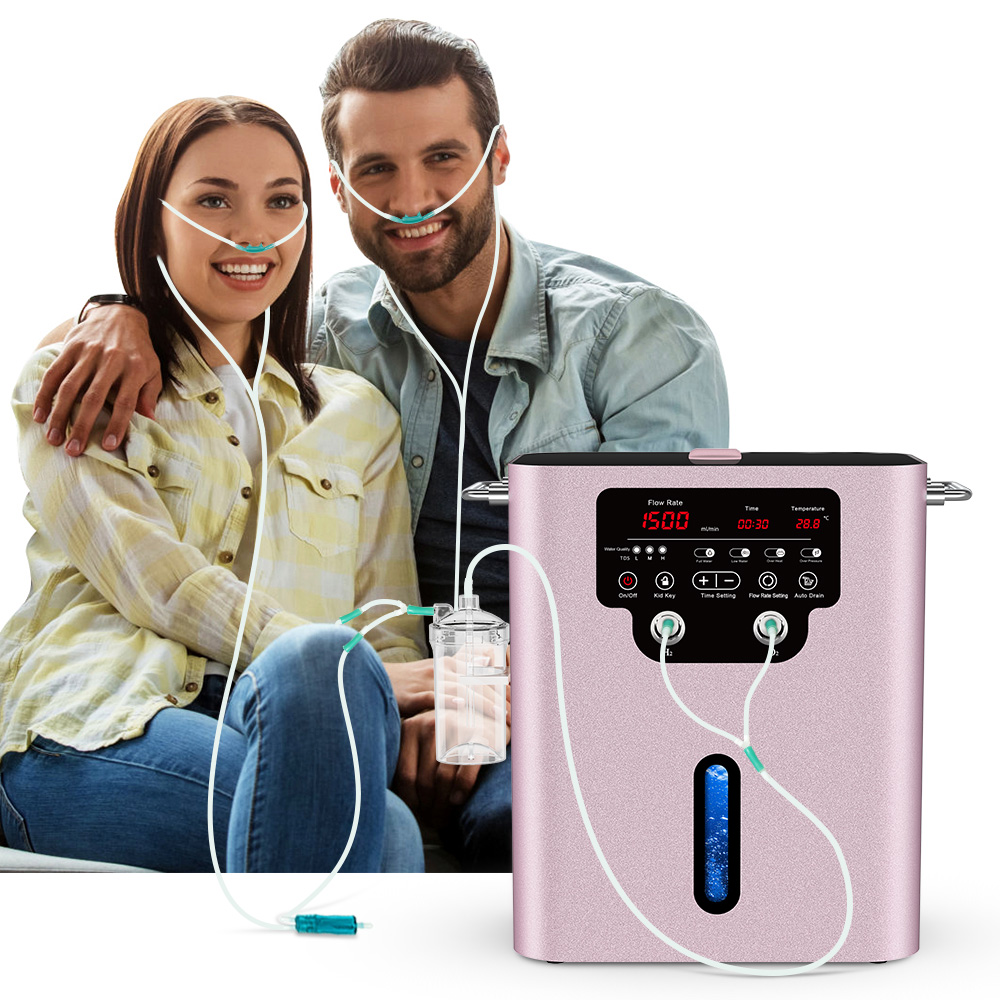
Hydrogen Gas vs. Hydrogen Water: Healing Benefits Compared
Hydrogen therapy has gained significant attention in recent years for its potential health benefits. Two primary methods of delivering hydrogen to the body are through **hydrogen gas inhalation** and **hydrogen-rich water consumption**. While both approaches aim to harness the antioxidant and anti-inflammatory properties of molecular hydrogen (H₂), they differ in their mechanisms of action, absorption pathways, and therapeutic applications. This blog explores the similarities and differences between hydrogen gas and hydrogen water, focusing on their circulation in the human body and their unique benefits.
---
Hydrogen Gas: Inhalation and Pulmonary Circulation
How It Works
Hydrogen gas is typically administered through inhalation, allowing it to enter the body via the respiratory system. Once inhaled, hydrogen molecules diffuse rapidly across the alveolar membrane in the lungs and enter the bloodstream. From there, hydrogen gas circulates throughout the body, reaching various tissues and organs.
Key Benefits
1. **Rapid Absorption**: Inhalation allows hydrogen to enter the bloodstream quickly, making it an efficient method for systemic delivery.
2. **Lung-Centric Benefits**: Hydrogen gas can directly interact with lung tissues, potentially benefiting respiratory conditions such as asthma, chronic obstructive pulmonary disease (COPD), and even lung inflammation caused by infections.
3. **Neuroprotective Effects**: Due to its ability to cross the blood-brain barrier, hydrogen gas may help reduce oxidative stress in the brain, offering potential benefits for neurodegenerative diseases like Parkinson’s and Alzheimer’s.
4. **Anti-Inflammatory Properties**: Hydrogen gas has been shown to reduce inflammation in various tissues, making it a promising therapy for inflammatory diseases.
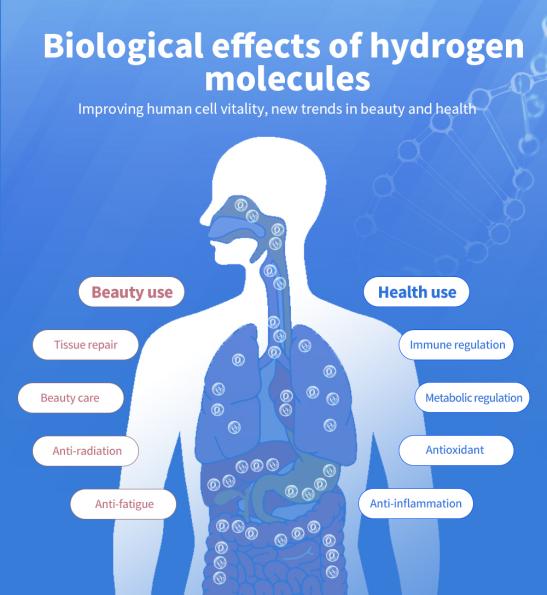
## Hydrogen Water: Oral Consumption and Gastrointestinal Absorption
### How It Works
Hydrogen-rich water is consumed orally, allowing hydrogen molecules to enter the body through the digestive system. Once ingested, hydrogen dissolves in the gastrointestinal tract and is absorbed into the bloodstream. It then circulates throughout the body, similar to hydrogen gas, but with a focus on gastrointestinal and systemic benefits.
### Key Benefits
1. **Gut Health**: Hydrogen water can directly interact with the gut microbiome, potentially improving digestive health and reducing symptoms of conditions like irritable bowel syndrome (IBS) and inflammatory bowel disease (IBD).
2. **Convenience**: Hydrogen water is easy to consume and can be integrated into daily routines without specialized equipment.
3. **Skin Health**: Topical application of hydrogen water (e.g., bathing or washing the face) can improve skin conditions by reducing oxidative stress and inflammation. It is particularly beneficial for conditions like eczema, psoriasis, and acne.
4. **Systemic Antioxidant Effects**: Like hydrogen gas, hydrogen water provides antioxidant benefits, helping to neutralize harmful free radicals and reduce oxidative stress throughout the body.
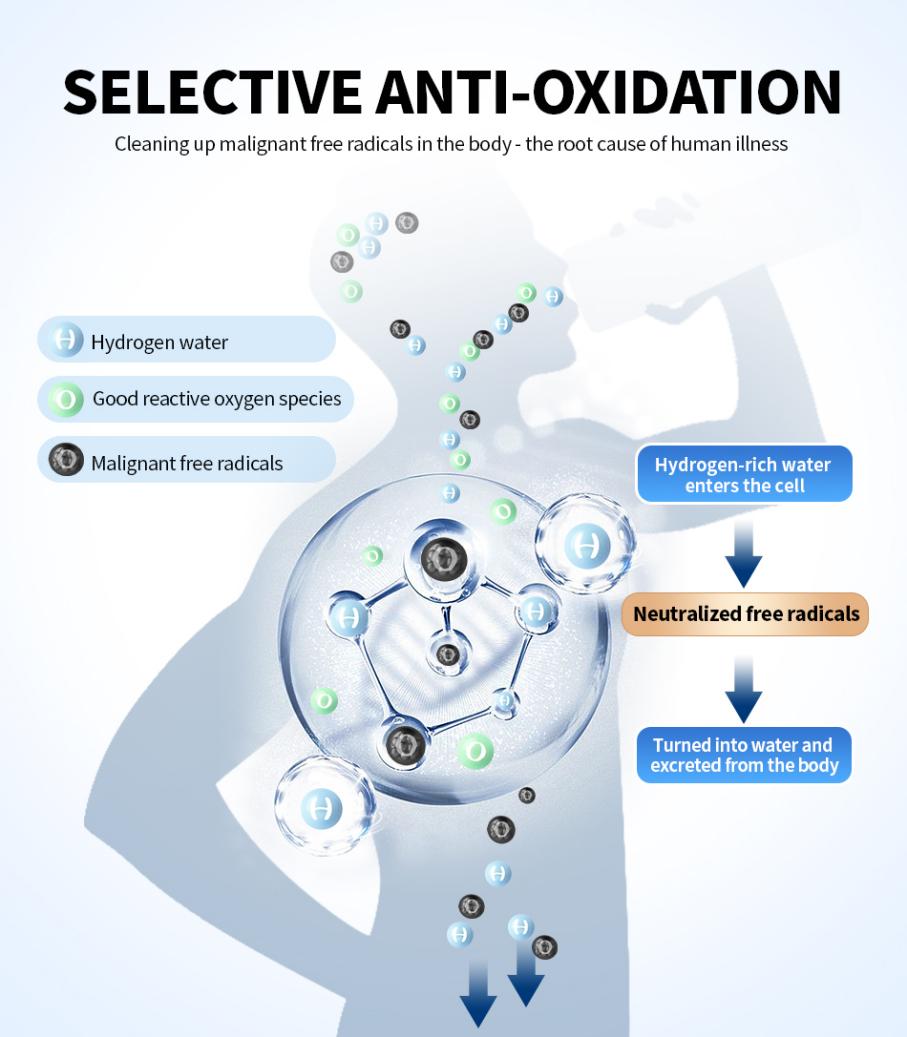
May have slower systemic effects compared to hydrogen gas inhalation.
---
## Comparing Hydrogen Gas and Hydrogen Water
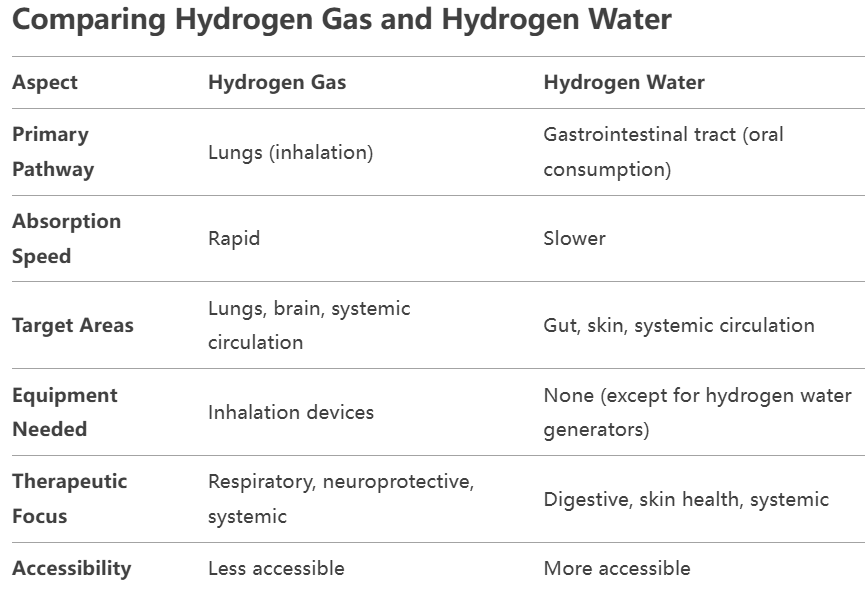
Synergistic Use of Hydrogen Gas and Hydrogen Water
While hydrogen gas and hydrogen water have distinct pathways and benefits, they can be used together to maximize therapeutic effects. For example:
- **Hydrogen Gas**: Ideal for addressing acute conditions or targeting the lungs and brain.
- **Hydrogen Water**: Perfect for daily maintenance, gut health, and skin care.
Combining both methods may provide a comprehensive approach to reducing oxidative stress, inflammation, and promoting overall health.
---
Conclusion: Choosing the Right Hydrogen Therapy
Both hydrogen gas and hydrogen water offer unique and complementary benefits for human health. Hydrogen gas excels in rapid systemic delivery and targeting the lungs and brain, while hydrogen water is more accessible and beneficial for gut health, skin care, and daily antioxidant support. The choice between the two depends on individual health goals, conditions, and preferences.
As research into hydrogen therapy continues to grow, it is clear that molecular hydrogen holds immense potential as a safe and effective therapeutic agent. Whether through inhalation or consumption, incorporating hydrogen into your wellness routine could be a step toward a healthier, more vibrant life.
---
Would you like to dive deeper into any specific aspect of hydrogen therapy? Let me know!



 Home
Home See here for a great way to help you improve your gastrointestinal health!
See here for a great way to help you improve your gastrointestinal health! 











